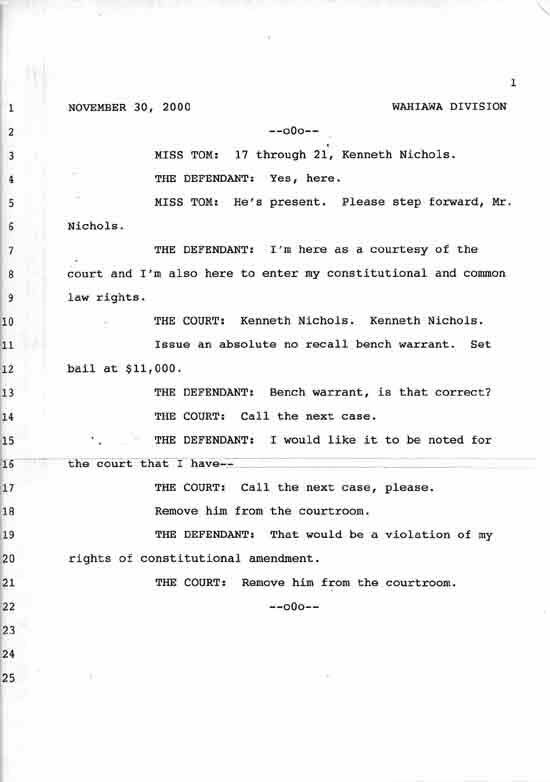The Constitution is Dead/b-CT-11-30-02.jpg
Previous | Home | Next
Court Transcripts Home
THE UNITED STATES CONSTITUTION
Article. VI. - Clause 2: This Constitution, and the Laws of the United States which shall be made in Pursuance thereof; and all Treaties made, or which shall be made, under the Authority of the United States, shall be the supreme Law of the Land; and the Judges in every State shall be bound thereby, any Thing in the Constitution or Laws of any State to the Contrary notwithstanding.
THE UNITED STATES BILL OF RIGHTS
Article IV - The right of the people to be secure in their persons, houses, papers, and effects, against unreasonable searches and seizures, shall not be violated, and no Warrants shall issue, but upon probable cause, supported by Oath or affirmation, and particularly describing the place to be searched, and the persons or things to be seized.
Article V - No person shall be held to answer for a capital, or otherwise infamous crime, unless on a presentment or indictment of a Grand Jury, except in cases arising in the land or naval forces, or in the Militia, when in actual service in time of War or public danger; nor shall any person be subject for the same offence to be twice put in jeopardy of life or limb; nor shall be compelled in any criminal case to be a witness against himself, nor be deprived of life, liberty, or property, without due process of law; nor shall private property be taken for public use, without just compensation.
Article VIII - Excessive bail shall not be required, nor excessive fines imposed, nor cruel and unusual punishments inflicted.
"I do solemnly swear that I will administer justice without respect to persons, and do equal right to the poor and to the rich; and that I will faithfully and impartially discharge all the duties incumbent on me as according to the best of my abilities and understanding, agreeably to the constitution, and laws of the United States."
Why does a judge swear to discharge his duties agreeably to the constitution of the United States, if that constitution forms no rule for his government? if it is closed upon him, and cannot be inspected by him?
If such be the real state of things, this is worse than solemn mockery. To prescribe, or to take this oath, becomes equally a crime.
Thus, the particular phraseology of the constitution of the United States confirms and strengthens the principle, supposed to be essential to all written constitutions, that a law repugnant to the constitution is void; and that courts, as well as other departments, are bound by that instrument.
Chief Justice Marshall
WILLIAM MARBURY v. JAMES MADISON, SECRETARY OF STATE OF THE UNITED STATES.
SUPREME COURT OF THE UNITED STATES 5 U.S. 137 FEBRUARY, 1803 Term
